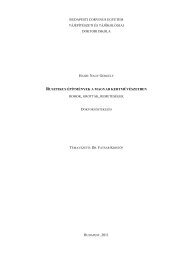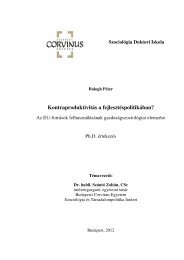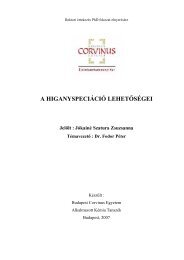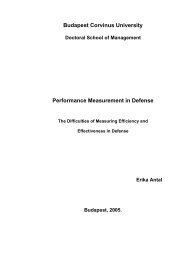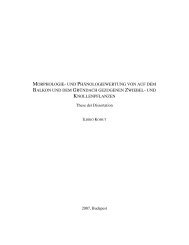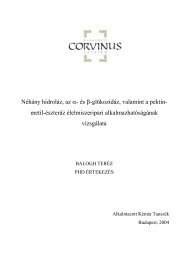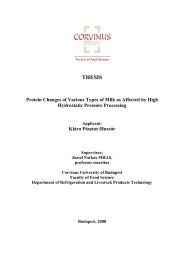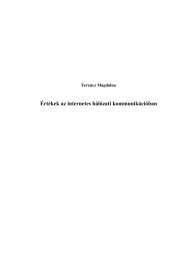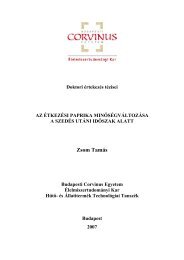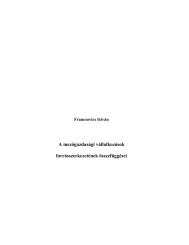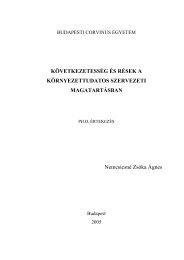értekezés - Budapesti Corvinus Egyetem
értekezés - Budapesti Corvinus Egyetem
értekezés - Budapesti Corvinus Egyetem
Create successful ePaper yourself
Turn your PDF publications into a flip-book with our unique Google optimized e-Paper software.
increases. Their results suggest that managers’ efforts to produce smooth financial<br />
statements may add value to the firm.<br />
Shin and Stulz [2000] choose a somewhat different methodology, but come to similar<br />
conclusions. They endeavor to understand how and why increases in expected equity<br />
volatility affect shareholder wealth, in light of the opposing theories of corporate finance<br />
literature. Namely, Merton [1974], Jensen and Meckling [1976] suggest that an increase in<br />
firm cash flow volatility – and as a result, an increase in equity volatility – has a positive<br />
impact on shareholder wealth, even though it may decrease firm value when doing so. The<br />
former views equity as option on firm value, the latter refers to the risk-shifting agency<br />
problem. Also, the literature on real options emphasizes the option properties of growth<br />
opportunities, and argues that cash flow volatility is precious as it makes growth options<br />
more valuable, with a consequent increase in equity volatility.<br />
The literature on capital structure (trade-off theory) and the positive theories on corporate<br />
risk management policies, however, show that increases in cash flow volatility have a<br />
detrimental effect on shareholder wealth. As to be shown in the subsequent sections, recent<br />
literature extends the contingent claim approach to pricing equity to take into account the<br />
endogeneity of the firm’s capital structure. Leland [1998] – for example – shows that<br />
shareholders may find it optimal to reduce firm volatility, and hence, equity volatility, to<br />
preserve the tax benefits of debt despite the existence of the agency costs of debt<br />
emphasized by Jensen and Meckling [1976]. With these theories, an increase in cash flow<br />
volatility that increases equity volatility affects shareholders adversely by reducing their<br />
expected cash flows, so that there is a negative relation between changes in equity<br />
volatility and shareholder wealth.<br />
A Shin-Stulz [2000] modell<br />
Shin and Stulz [2000], therefore, empirically analyze the nature of the relation between<br />
shareholder wealth and changes in equity volatility. They argue that expected equity<br />
volatility generally increases with expected firm cash flow volatility, so that the changes in<br />
192 Allayannis and Weston [2001] assume that the use of foreign exchange derivatives is a proxy for risk<br />
management activity within the firm, so that the hedging premium reflects the premium for risk management<br />
rather than simply the benefit from hedging foreign currency risk.<br />
191



